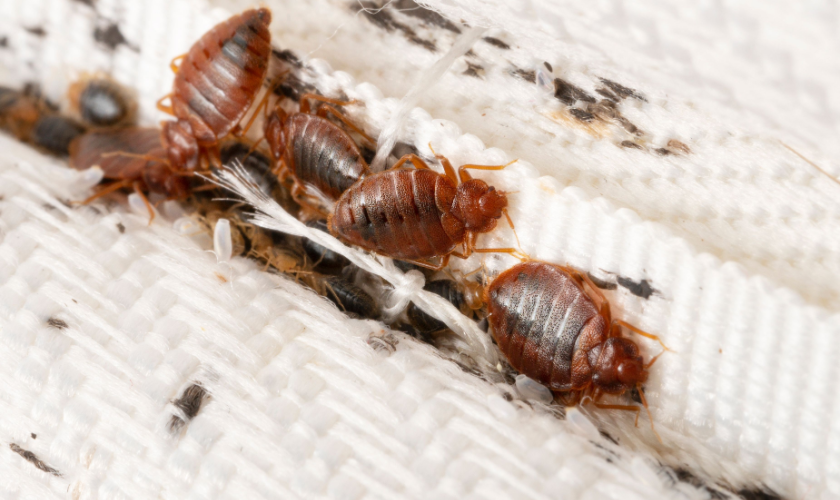Leading Kings Cincinnati Bug Control Services: Exterminator Proficiency
Leading Kings Cincinnati Bug Control Services: Exterminator Proficiency
Blog Article
Kinds Of Pest Control: Which Method Is Right for Your Invasion?
When faced with a parasite infestation, the selection of an appropriate approach for insect control is crucial in properly managing the situation. From chemical treatments to biological remedies, there exists a series of approaches that can be used to address various sorts of insects. Each approach features its own set of considerations and benefits, making the decision-making process a nuanced one. Recognizing the nuances of each approach and reviewing their compatibility with the particular bug invasion available is necessary for accomplishing lasting success in parasite administration. By checking out the various kinds of parasite control techniques offered, people can make enlightened choices customized to their special situations, making certain a more effective and sustainable end result in pest removal.
Chemical Pest Control
Chemical parasite control involves using artificial or normally obtained chemicals to manage and remove pest populations efficiently. This approach is generally utilized in agriculture, forestry, and domestic setups to battle a variety of parasites, consisting of weeds, rats, and insects. Using chemical pesticides can supply fast and targeted remedies to pest infestations, making it a preferred selection for numerous individuals and services.
Among the essential benefits of chemical bug control is its capability to swiftly remove bugs, decreasing the threat of damage to plants, building, and human health. By utilizing specific chemicals that target particular parasites, this technique can properly regulate invasions while minimizing injury to useful microorganisms and the setting when used correctly.
However, making use of chemical bug control also elevates issues concerning prospective negative results on non-target varieties, water sources, and human health and wellness. It is important to comply with safety and security guidelines, apply chemicals sensibly, and think about different insect control approaches to reduce these dangers and make certain sustainable parasite administration methods.
Organic Parasite Control
Biological insect control, also called biocontrol, makes use of living microorganisms to handle and decrease pest populaces normally. This method uses the power of nature to control parasites without the need for artificial chemicals. Biocontrol can involve the intro of all-natural opponents of the bug varieties, such as bloodsuckers, pathogens, or killers, to subdue insect populaces. By using the bug's natural killers or pathogens, biological insect control uses a sustainable and eco friendly remedy to pest administration.

Mechanical Bug Control
Utilizing physical and manual methods to take care of bug populaces, mechanical pest control offers an alternative technique that does not rely upon using living organisms or artificial chemicals. This method entails the use of barriers, catches, or other devices to literally prevent or get rid of bugs. By blocking parasite access points or establishing up traps to catch them, mechanical bug control can properly reduce problems without introducing chemicals into the environment.
One common example of mechanical parasite control is making use of mesh screens on doors and home windows to avoid insects from entering structures. This basic yet reliable approach serves as a physical obstacle, maintaining parasites out while enabling correct ventilation. Additionally, gadgets like mousetraps, fly swatters, and ultrasonic repellents drop under the mechanical insect control group.
While mechanical pest control approaches can be labor-intensive and require regular monitoring and upkeep, they provide a lasting and eco-friendly remedy for handling insect problems. By integrating different mechanical methods, home owners can produce an extensive insect control approach that lessens dependence on chemical pesticides.
Physical Parasite Control

Some usual physical parasite control approaches include using obstacles such as internet or displays to avoid parasite entrance, catches to record and eliminate parasites, and hand-picking to literally eliminate pests from plants or structures. Furthermore, strategies like warm treatments can be utilized to manage bugs like bed insects by raising the temperature level to levels that are deadly to the bugs.
Physical pest control is especially beneficial in integrated parasite management (IPM) techniques, where numerous insect control techniques are incorporated for effective insect management while lessening making use of chemicals. By making use of physical insect control strategies, people can effectively attend to parasite infestations with very little ecological influence.
Integrated Parasite Management
When applying physical insect control methods as part of pest management approaches, Integrated Insect Administration (IPM) becomes an extensive strategy that leverages numerous methods to successfully control pest populaces. IPM focuses on lasting prevention of bugs through a mix of organic, social, physical, and chemical devices tailored to particular pest issues. By integrating numerous control tactics, IPM aims to check my blog reduce the dangers linked with insects while likewise decreasing reliance on chemical options.
One trick facet of IPM is the focus on surveillance and evaluating pest populaces to determine the most appropriate control techniques. This positive technique enables very early treatment and targeted strategies, bring about more reliable bug management. Additionally, IPM advertises eco friendly practices by focusing on non-chemical control approaches and just using pesticides as a last hope.
Verdict

By using the insect's all-natural killers or microorganisms, biological bug control offers a sustainable and environmentally pleasant service to pest management. - Kings pest control cincinnati oh
Utilizing physical and hands-on methods to take care of bug populaces, mechanical pest control offers an alternate technique that does not rely on the usage of living microorganisms or synthetic chemicals.An efficient approach to taking care of insect populaces without counting on chemical or biological techniques entails the usage of physical pest control techniques.When applying physical pest control techniques as part of bug administration techniques, Integrated Pest Monitoring (IPM) arises as an extensive method that leverages numerous strategies to effectively control pest populations. Chemical bug control involves the usage of pesticides, organic insect control uses natural predators, mechanical parasite control entails physical barriers, physical pest control includes trapping or removing pests, and integrated pest monitoring incorporates numerous methods for a holistic technique to pest control.
Report this page